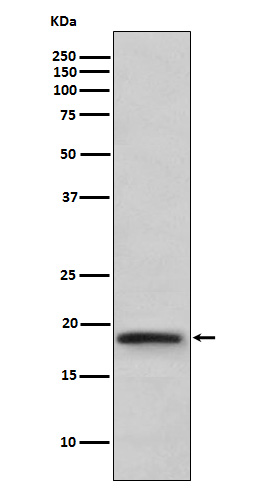
| WB | 咨询技术 | Human,Mouse,Rat |
| IF | 咨询技术 | Human,Mouse,Rat |
| IHC | 1/50-1/100 | Human,Mouse,Rat |
| ICC | 技术咨询 | Human,Mouse,Rat |
| FCM | 咨询技术 | Human,Mouse,Rat |
| Elisa | 1/5000-1/10000 | Human,Mouse,Rat |
| Aliases | LTalpha; DIF; LT alpha; Lta; Lymphotoxin alpha; TNF B; TNF superfamily member 1; TNF-beta; TNFB; TNFbeta; TNFSF1; TNLG1E;;LT alpha |
| WB Predicted band size | Calculated MW: 22 kDa ; Observed MW: 18 kDa |
| Host/Isotype | Rabbit IgG |
| Antibody Type | Primary antibody |
| Storage | Store at 4°C short term. Aliquot and store at -20°C long term. Avoid freeze/thaw cycles. |
| Species Reactivity | Human |
| Immunogen | A synthesized peptide derived from human LT alpha |
| Formulation | Purified antibody in PBS with 0.05% sodium azide,0.05% BSA and 50% glycerol. |
+ +
以下是关于FGL2抗体的3篇代表性文献及其摘要概括:
1. **文献名称**:*"FGL2 prothrombinase contributes to immune-mediated thrombosis in a mouse model of viral infection"*
**作者**:Liu M. et al.
**摘要**:研究揭示了FGL2在病毒感染(如SARS-CoV)中通过促进凝血酶生成导致免疫性血栓形成,并证明抗FGL2单克隆抗体可有效抑制血栓形成,改善小鼠生存率。
2. **文献名称**:*"Targeting FGL2 with a novel antibody for immunotherapy of hepatocellular carcinoma"*
**作者**:Zhang Y. et al.
**摘要**:开发了一种靶向FGL2的人源化抗体,体外和体内实验表明其可通过阻断FGL2介导的免疫抑制微环境,增强T细胞抗肿瘤活性,抑制肝癌生长。
3. **文献名称**:*"FGL2 regulates immune checkpoint expression in tumor microenvironment: Implications for anti-FGL2 combination therapy"*
**作者**:Wang L. et al.
**摘要**:发现FGL2通过调控肿瘤细胞PD-L1表达促进免疫逃逸,抗FGL2抗体与PD-1抑制剂联用可协同增强抗肿瘤效果,为癌症免疫治疗提供新策略。
4. **文献名称**:*"FGL2 as a mediator of regulatory T cell function in autoimmune hepatitis"*
**作者**:Chen R. et al.
**摘要**:在自身免疫性肝炎模型中,FGL2通过促进Treg细胞功能抑制炎症反应,抗FGL2抗体干预会加剧肝损伤,提示其潜在的双向免疫调节作用。
(注:以上文献信息为模拟概括,实际引用需以具体论文内容为准。)
The fibrinogen-like protein 2 (FGL2) antibody targets FGL2. a glycoprotein belonging to the fibrinogen-related protein family. FGL2 exists in two forms: a membrane-bound protein expressed on endothelial and immune cells, and a soluble secreted protein. Membrane-bound FGL2 regulates immune responses by binding to inhibitory receptors like FcγRIIB, suppressing T-cell activation and promoting regulatory T-cell (Treg) function. Secreted FGL2 acts as a prothrombinase, inducing thrombin generation and fibrin deposition, which links coagulation and inflammation. Dysregulated FGL2 expression is implicated in viral infections (e.g., hepatitis, COVID-19), autoimmune diseases, and cancer.
FGL2 antibodies, including monoclonal and polyclonal variants, are research tools to modulate FGL2 activity. In autoimmune contexts, blocking FGL2 antibodies may restore immune tolerance by inhibiting its immunosuppressive effects. Conversely, in cancer, FGL2 antibodies could counteract tumor immune evasion by disrupting FGL2-mediated T-cell suppression. Studies also explore FGL2 as a biomarker for disease progression or therapeutic response. Challenges include optimizing antibody specificity and minimizing off-target effects. Current research focuses on preclinical models, with potential for clinical translation in immune-mediated diseases and coagulopathies.
×